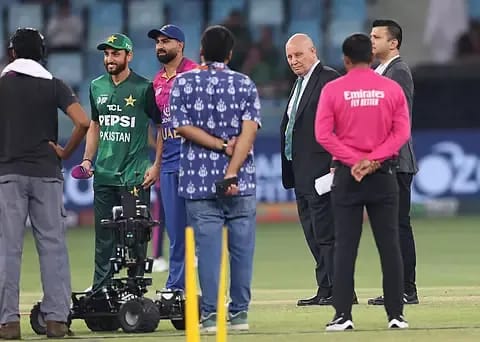India–Pakistan handshake-gate explained: how a last-minute message trapped Andy Pycroft

Pycroft and the Handshake Row: The Complete Story Behind a Messy Week
The India–Pakistan “handshake-gate” blew up fast. Minutes before the toss on September 14, match referee Andy Pycroft was told there would be no handshake between the captains. He passed this on to Pakistan to avoid an awkward moment on live TV. A routine message turned into a big controversy. Pakistan’s board filed a complaint, said the spirit of cricket was hurt, and even pushed for Pycroft to be removed from the Asia Cup.
What happened before the toss
Pycroft got the message just as he was walking out. It said there would be no handshake that day. He did not have time to check with higher officials. He chose to inform Pakistan’s captain so there would not be a snub at the toss. He saw himself as the messenger, not the decision-maker.
Why Pakistan got angry
Pakistan felt a neutral referee should not carry such a message. They said he should have told the ICC at once instead of telling their captain. They also said this went against the spirit of the game. The complaint demanded Pycroft’s removal. At one point, Pakistan even considered not playing if he stayed on the game.
The ICC’s stance
The ICC backed Pycroft. They said he acted professionally with almost no time and tried to prevent a public scene. They also said referees do not control team or organiser protocols that are decided off the field. According to the ICC, the real question was why the handshake was dropped, not how the referee relayed the message.
A tense day, then a delayed match
Before Pakistan’s next match against the UAE, things got heated. The team delayed leaving the hotel. After a series of calls between the ICC and the PCB, a meeting was set up at the ground. Pycroft met Pakistan’s captain and support staff. He explained he was only relaying a late decision and expressed regret for the confusion and timing. The game went ahead after about an hour’s delay.
Was there an apology?
Pakistan said Pycroft apologised. Others present said it was not a formal apology but regret over the miscommunication and the poor timing before a big game. Either way, the immediate tension cooled, and the team took the field.
The back-and-forth after that
Pakistan argued the ICC review did not hear all their witnesses. They questioned how a referee could pass on a directive they felt went against cricket’s spirit. The ICC replied that changing officials at a team’s request sets a dangerous precedent. They also said Pakistan was welcome to submit more evidence but none came. The ICC repeated that Pycroft did not break any rules.
What this means for the rivalry
A simple pre-match custom became a headline. The attention shifted from cricket to protocol. It showed how fragile big tournaments can be when late decisions meet high-pressure games. It also underlined a basic point: referees manage the match; they do not make political or board-level calls. In the end, the tournament moved on, but the episode will be remembered as a lesson in timing, communication, and how small gestures can carry big weight.